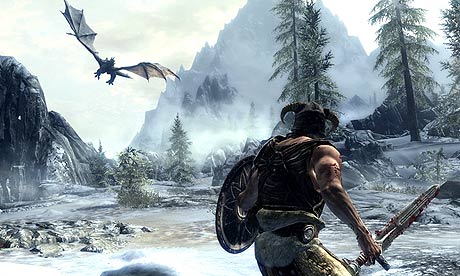Elder Scrolls: Skyrim
© Bethesda
Last year was steeped in fantasy for me. I knew that I had to prepare for my role as Dungeon Master, and I sought out inspiration where I could. For those who know, Skyrim is a game that has been out for quite a long time. Originally released in 2011, it was a game that I heard about constantly. Renowned for its narrative focused side quests and addictive gameplay, Skyrim seemed like a daunting game to pick up. Nevertheless, I took the leap and purchased it during a steam sale.
Even with everything I heard about the game, I wasn’t quite sure what to expect. The game didn’t seem too impressive to me when I started it. With pretty average controls and a clunky UI I spent the first 15 minutes wondering what the fuss was about. It wasn’t until I got into the meat of the game that I realized Skyrim’s true appeal. The game is vast in scope and incredibly so. The details of the game are broken down so much that you can pick up all of the individual plates and bowls in all of the different houses and dungeons you run into. Books can be found on dresser tables beside beds where any and all of them can be picked up and read.
On top of the small details, the game also holds a huge number of quests and locations. Even with the map as sprawling as it is, the open world of Skyrim is thick with dungeons, caves, and hideouts. Where most fantasy games put players on a linear path through the main plot, Skyrim takes a completely different approach. After the first few quests, the game essentially lets the player decide what they want to do with little interference. The main plotline of Skyrim makes up a relatively small percentage of the game, and leaves the player to decide how they want to play the game. This is the heart of what makes Skyrim so great because it becomes a game of exploration more than anything.
© Bethesda
Of course, with the game as ambitiously large and encompassing as it is, Skyrim naturally suffers some flaws. First is that the game loses much of its polish, which is sacrificed for content. Instead of spending resources smoothing out rough patches and fixing some glitches, it’s clear that Bethesda opted to make a deeper experience. Normally this isn’t a great idea as players can use exploits to break the game but it’s clear by the design that Bethesda didn’t care. Skyrim is very much a single player experience and Bethesda knew this. If players wanted to unfairly play the game using exploits, hacks or mods, they could do so freely without bothering the rest of the player base.
© Bethesda
In the end, Skyrim sucked me in deep. Late night hours passed by as I picked up alchemy ingredients, mined precious metals and slaughtered bandits. I had a master goal to maximize my character and his gear. I followed through with this plan using online guides, countless hours and zero hacks. When I finally completed my epic quest to create the most powerful items I could, I had an unreasonably high sense of accomplishment. This was quickly followed by my immediate decline in interest in Skyrim, as I had officially broken the game with my incredibly powerful demon armor and dragon bone swords. Still, I sunk an unforgivable number of hours into the game and walked away satisfied with my experience.


